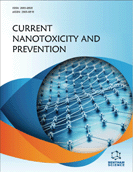Abstract
In recent decades, nanoscience and nanotechnology have played a revolutionary role in the therapeutic domain. Manipulation of atoms and molecules at the nanometric scale endows biomaterials with specific physicochemical properties. Skin being the largest organ of the human body and an extensively exploited route for drug delivery, is one of the primary sites for exposure to nanoparticulate matter. Skin care products and cosmetics also constitute a major source of exposure to metallic nanoparticles. Metallic nanoparticles are widely used for therapeutic, diagnostic and cosmetic purposes. The potential risks associated with their use in modern medicine are a subject of extensive research. The present article aims to discuss the toxicity concerns associated with the use of metallic nanoparticles in dermatological products, and provide an overview of their in vitro and in vivo methods of nanotoxicity assessment, as per OECD guidelines. It also presents a concise account of the lacunae in the existing guideline, which need to be addressed in order to adapt the prescribed tests to the testing of nanoparticles. The review also gives an insight into the gaps in the in vitro, in vivo correlation of data furnished by various research groups. It provides a glimpse of important regulatory aspects applicable to the evaluation of topically applied nanoparticulate systems. In the end, it discusses the challenges and future perspectives in order to strengthen the scientific investigations in this domain.
Keywords: Nanocosmetics, OECD guidelines, skin targeting, nanotoxicity, risk assessment, regulatory status.
Graphical Abstract
[http://dx.doi.org/10.1590/abd1806-4841.20142228] [PMID: 24626657]
[http://dx.doi.org/10.1007/s40089-017-0221-3]
[http://dx.doi.org/10.2147/IJN.S170745] [PMID: 30122919]
[http://dx.doi.org/10.1007/s00420-009-0458-x] [PMID: 19705142]
[http://dx.doi.org/10.1177/2397847317726352]
[http://dx.doi.org/10.1007/978-3-030-16573-4_14]
[http://dx.doi.org/10.4155/tde-2018-0060] [PMID: 31184548]
[http://dx.doi.org/10.1002/jps.21817] [PMID: 19670463]
[http://dx.doi.org/10.1201/9781351137263-10]
[http://dx.doi.org/10.1002/wnan.1244] [PMID: 24123977]
[http://dx.doi.org/10.1039/c1nr11109d] [PMID: 22064944]
[http://dx.doi.org/10.1166/jbn.2010.1143] [PMID: 21329039]
[http://dx.doi.org/10.1038/srep16908] [PMID: 26584777]
[http://dx.doi.org/10.1016/j.ijheh.2016.05.009] [PMID: 27289581]
[http://dx.doi.org/10.1016/j.ijheh.2016.05.003] [PMID: 27283207]
[http://dx.doi.org/10.1002/jat.3499] [PMID: 28799656]
[http://dx.doi.org/10.1007/978-1-62703-002-1_16] [PMID: 22975968]
[http://dx.doi.org/10.1016/0022-1759(83)90303-4] [PMID: 6606682]
[http://dx.doi.org/10.1016/S0887-2333(98)00019-8] [PMID: 20654431]
[PMID: 11379538]
[http://dx.doi.org/10.1016/j.yrtph.2013.11.007] [PMID: 24269723]
[http://dx.doi.org/10.1016/0887-2333(93)90117-N] [PMID: 20732176]
[http://dx.doi.org/10.1016/0378-4274(85)90046-3] [PMID: 3983963]
[http://dx.doi.org/10.1093/toxsci/kfm064] [PMID: 17400584]
[http://dx.doi.org/10.1016/j.taap.2010.03.009] [PMID: 20307559]
[http://dx.doi.org/10.1016/j.tiv.2010.12.014] [PMID: 21195160]
[http://dx.doi.org/10.1787/9789264070585-en]
[http://dx.doi.org/10.2478/intox-2018-0001] [PMID: 30181707]
[http://dx.doi.org/10.1007/s00204-011-0693-2] [PMID: 21533817]
[http://dx.doi.org/10.1080/15569527.2016.1211671] [PMID: 27439971]
[http://dx.doi.org/10.5487/TR.2016.32.4.311] [PMID: 27818733]
[http://dx.doi.org/10.3390/nano7030056] [PMID: 28336890]
[PMID: 24250657]
[http://dx.doi.org/10.2147/IJN.S17065] [PMID: 21720498]
[http://dx.doi.org/10.1016/j.tiv.2011.08.011] [PMID: 21903158]
[http://dx.doi.org/10.1080/17458080.2015.1014934]
[http://dx.doi.org/10.3109/17435390.2014.968889] [PMID: 25325158]
[http://dx.doi.org/10.1016/j.tiv.2011.05.022] [PMID: 21664450]
[http://dx.doi.org/10.1002/smll.200500492] [PMID: 17193121]
[http://dx.doi.org/10.1002/smll.200800798] [PMID: 19197964]
[http://dx.doi.org/10.1016/j.tox.2009.10.011] [PMID: 19850098]
[PMID: 25565832]
[http://dx.doi.org/10.1166/jnn.2011.4250] [PMID: 21780369]
[http://dx.doi.org/10.1016/j.biomaterials.2011.07.036] [PMID: 21807406]
[http://dx.doi.org/10.1186/s12989-016-0161-5] [PMID: 27613375]
[http://dx.doi.org/10.1007/s40257-019-00480-4] [PMID: 31677110]
[http://dx.doi.org/10.3390/molecules191220780] [PMID: 25514222]
[http://dx.doi.org/10.3389/fimmu.2017.00957]
[http://dx.doi.org/10.1001/archderm.1997.03890460078009] [PMID: 9382564]
[http://dx.doi.org/10.1159/000501732] [PMID: 31357203]
[http://dx.doi.org/10.1159/000131410] [PMID: 18460878]
[http://dx.doi.org/10.1016/j.addr.2011.01.005] [PMID: 21241756]
[http://dx.doi.org/10.1089/aivt.2015.0002]
[http://dx.doi.org/10.1080/17425247.2020.1772750] [PMID: 32441158]
[http://dx.doi.org/10.1016/j.tiv.2015.07.012] [PMID: 26187475]
[http://dx.doi.org/10.2147/IJN.S225451] [PMID: 31849463]
[http://dx.doi.org/10.1016/j.taap.2015.05.017] [PMID: 26028481]
[http://dx.doi.org/10.1038/srep37471] [PMID: 27869150]
[http://dx.doi.org/10.1016/j.fct.2015.06.020] [PMID: 26159063]
[http://dx.doi.org/10.3390/nano10050979] [PMID: 32443655]
[http://dx.doi.org/10.1080/15376516.2019.1566425] [PMID: 30636497]
[http://dx.doi.org/10.1016/j.biopha.2017.11.026] [PMID: 29793315]
 6
6 1
1

